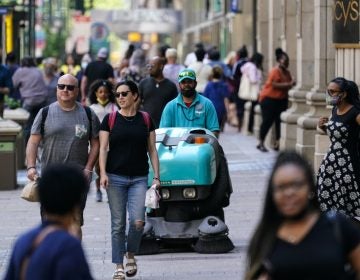Rare, centuries-old compass draws crowd to Germantown Historial Society
The opportunity to get a rare glimpse into the world of brass restoration was the draw at a Thursday afternoon event at the Germantown Historical Society. What a dozen eager attendees saw there was a compass created by famous colonial era surveyor, astronomer and inventor David Rittenhouse.
The brass instrument, one of only 12 known in the world, was in the GHS archives for 200 years when Jeffrey Lock, an Ohio-based antique restoration artist noticed minor, but noticeable, damage during a visit a year ago.
Lock was concerned that the piece had been poorly lacquered and cleaned improperly in the past. In an effort to see the piece shine, Lock offered to restore the compass pro bono. The work would have cost a private collector thousands of dollars.
“It was really enjoyable for me because David Rittenhouse, as a maker, is probably my hero,” he said of a man born along the Monoshone Creek in Germantown’s Rittenhouse Town and for whose family Rittenhouse Square was named. “When you get a chance to work on an instrument like this, it’s almost like he’s teaching you from a distance.”
Lock engraves his own compasses and creates replacement metal parts. He explained that in the case of the Rittenhouse compass, the lacquered finish was done by volunteers who didn’t realize the intricacies of the materials.
In some cases, good intentions can damage valuable pieces of history, and some museums aren’t so willing to let the artifacts be handled as GHS was in this case.
“They have an instrument that is very valuable, that needs to be restored or conserved, but because some conservators are taught it’s better to do nothing than anything, they are frozen,” he said, adding that brass doesn’t naturally deteriorate and that many instruments have been around since the 1500s.
The compass will be on display during the At Home in Germantown 1750-1900 exhibit at the museum as part of the permanent collection.
Visitors were impressed
Dan Callard, who has lived in Germantown for 40 years, said he knew Rittenhouse was a clockmaker, but not a survey compass maker as well.
“In the past hour, I’ve learned more than I’ve probably learned in the past couple of years,” Callard said.
Those lessons included the fact that many American-made compasses were more reliable than their European counterparts because their creators were clockmakers who used the same instruments for accuracy, or that this compass uses vernier scale measurement which compensates for changes in magnetic north.
“It’s exciting. These guys are scientists,” Callard noted. “It’s nice to see them investigating these old things and applying their modern ideas to old science.”
WHYY is your source for fact-based, in-depth journalism and information. As a nonprofit organization, we rely on financial support from readers like you. Please give today.










